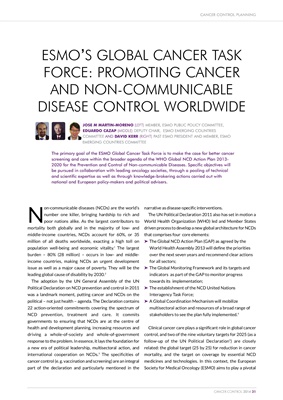
role, gathering cancer experts at the international, regional
and country level to coordinate efforts with the global
strategy. This simultaneous, top-down, bottom-up approach
is considered the best way to face the problem, combining
international political and governmental pressure with the
participation of scientific groups and civil society at the local
level.
The ESMO Global Cancer Task Force
The importance of NCD professional organizations in NCD
control was clearly stated by WHO Director-General during
the UN High Level Meeting (HLM) in 2011. ESMO was very
active at the time and spoke at pre-UN meetings such as the
WHO Global Forum in Moscow, it petitioned EU ministries of
health for support, and the ESMO President (at the time, David
Kerr) personally attended the UN HLM itself in New York.
Since achieving official status with WHO in 2013, ESMO
has presented a Statement on the WHO Global NCD Action
Plan at the 66th World Health Assembly in 2013.6 The
statement was supported by the Pain and Policy Studies
Group (PPSG) of the University of Wisconsin Carbone
Cancer Center, the Union for International Cancer Control
(UICC), and the International Network for Cancer Treatment
and Research (INCTR). It was also delivered to the ministries
of health of 28 European countries by the ESMO national
representatives. It highlighted the critical need for National
cancer control programmes at the country level and the
relevance of linking screening and early detection with health
care systems capacity. Another important recommendation
from the ESMO document is to build upon the strengthening
of primary care for NCDs as requested by GAP and to extend
treatment options at all levels of care settings by including
opportunities for surgery, radiotherapy and systemic
therapies that can offer cure and improve the quality-of-life
and survival of cancer patients in all resource settings. ESMO
experts also strongly emphasize the need and feasibility to
prioritize the availability of a basic set of treatment options,
including palliative care interventions and improvement of
access to morphine for pain relief.
To achieve these goals, ESMO is leading a collaborative
effort to help in the analysis and mapping of the current
situation of the availability of cancer medicines globally as
well as in the development of better tools to advise Member
States on achieving the cancer contribution to the global
NCD target of 80% availability of affordable essential
medicines.
This has resulted in the creation of an ESMO Global Cancer
Task Force, whose mission is to provide WHO with guidance
and technical expertise to interpret the evidence and share
best practice with Member States who are tasked with
implementing the Plan at national levels.
Contributors with ESMO to defining the initial goals of this
Task Force currently include the American Society of Clinical
Oncology (ASCO), the European School of Oncology (ESO),
the Indian Society of Medical and Pediatric Oncology
(ISMPO), the Institute of Cancer Policy at Kings College, the
International Cancer Control Congress Organization (ICCC),
the International Network for Cancer Treatment and
Research (INCTR), the International Society of Geriatric
Oncology (SIOG), the Pain and Policy Studies Group of the
University of Wisconsin Carbone Cancer Center (PPSG), the
Latin-American and Caribbean Society of Medical Oncology
(SLACOM), the London School of Economics (LSE), the
Middle East Cancer Consortium (MECC), the University
Clinical Hospital of the University of Valencia's Medical
School, the Union for International Cancer Control (UICC),
the US NCI Center for Global Health and the WHO. Other
organizations are envisioned to join the network now that its
objectives are clearly defined.
Task Force objectives
The ESMO Global Cancer Task Force seeks to support our
commitment to the global cancer community and reinforce
our belief that patients everywhere should have access to the
best available treatment. Its collaborative network intends to
work in partnership and span all five continents and the
complete spectrum of cancer control. Particular emphasis
will be given to the areas detailed below. Our intention is to
do our utmost to provide ideas and suggestions to WHO
according to WHO priorities and timelines.
Fill gaps in scientific cancer evidence
The Global Cancer Task Force will help identify what cancer
evidence is missing at the global level in order to develop
resource-based guidelines, beginning with the cancers listed
CANCER CONTROL PLANNING
32 CANCER CONTROL 2014
In collaboration with our colleagues in
low- and middle-income countries, we
aim to provide recommendations to
WHO on the Package of Essential
Non-communicable Disease
Interventions (PEN) on how to
integrate cancer into primary health
care in low-resource settings